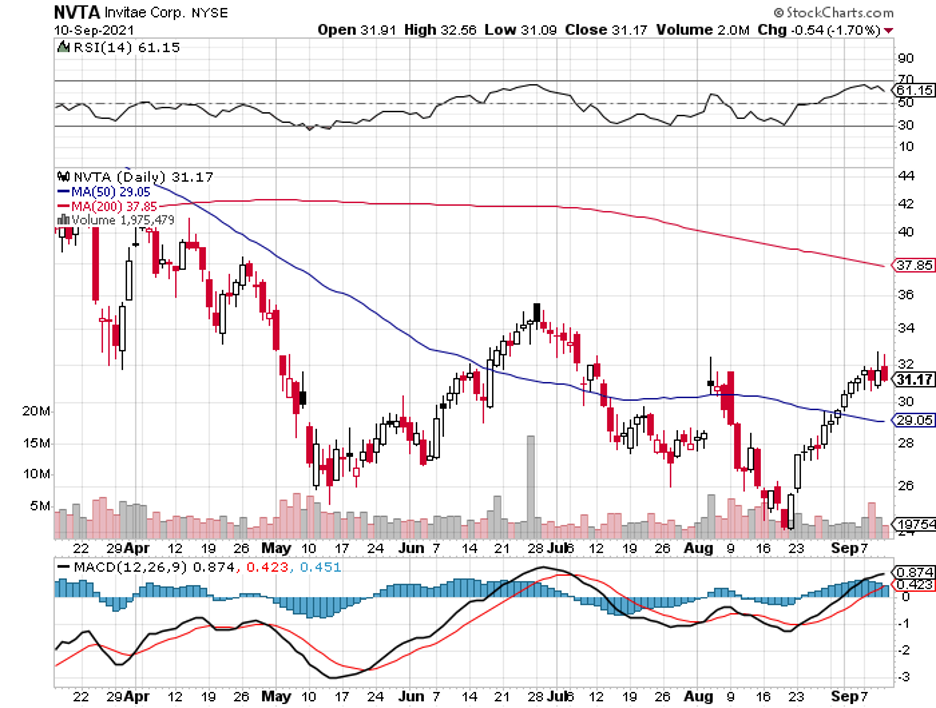Is This the Biggest Winner in a Winner-Take-Most Market?
One of the most underappreciated names in the biotechnology sector might just be the biggest winner in a winner-take-most market today: Invitae (NVTA).
Despite being at the receiving end of a seemingly endless flogging since the year started, Invitae remains an attractive stock for the likes of Cathie Woods.
In fact, this San Francisco-based company is one of the Top 20 holdings of ARK Innovation (ARKK) and ARK Genomic Revolution (ARKG).
Described by Woods as "probably one of the most important companies in the genomic revolution," Invitae is the sixth-largest holding of the ARK Investment portfolio with more than $1 billion worth of exposure.
Aside from ARK, Invitae also recently attracted the attention of Japanese tech conglomerate SoftBank (SFTBY), which came in the form of $1.2 billion worth of convertible bond investment.
Amid all these, why is Invitae still under-appreciated?
First, it’s essential to understand that biotech companies opt to target particular niches where they aim to maintain high prices and maximize profitability for as long as possible.
That way, they can maintain and continue to boost their profits.
This results in highly prohibitive costs in the healthcare innovation section, which in turn cause rationing of cases because only a select group of patients can actually afford the exorbitant fees for the innovative drug or therapy.
While rationing care and maximizing profits are obviously great for investors, this makes the innovations inaccessible to people who could not shell out the cash to take the tests or treatments.
This is where Invitae comes in.
Basically, Invitae is taking a completely different approach compared to its peers in the biotechnology world.
According to the company, its mission is "to bring comprehensive genetic information into mainstream medicine to improve healthcare for billions of people."
How will Invitae achieve this?
Instead of choosing a single genetic variant to test, which costs over $1,000 each, the company is developing a testing platform that can identify thousands of genetic variants.
The clincher? This will only cost less than $250 for the entire test panel.
This nonconforming approach to biotechnological innovations is what has primarily led to Invitae’s under-appreciation.
However, Invitae’s mission holds incredible potential.
What it means in medical terms is that the company can help about 1 in 6 people suffering from a medical condition with an inherent genetic factor.
What it means in financial terms is that the company holds the possibility of generating several hundred dollars per year from over 2 billion people—a jaw-dropping market opportunity worth $4 trillion.
One of Invitae’s key ideas is to grant people access to their genetic information and then interpret it for them.
To me, this indicates the company’s goal of doing for genetics what Amazon (AMZN) has done for book buyers.
The next question is this: Can Invitae truly accomplish this?
Let’s consider the company’s growth trajectory along with the catalysts ahead.
So far, three catalysts can push the company towards its goals.
First is the steady growth in testing volume. As with most medical procedures, the volume of genetic testing went down during the COVID-19 pandemic. However, this is now rebounding gradually.
In the first quarter of 2021, the billable volume went up by 72% year over year, with roughly 259,000 tests in that quarter alone.
Traditionally, genetic testing is generally driven by orders from doctors and the cooperation of health plans to cover the tests.
Moving forward, we expect pharmaceutical firms to play more significant roles in promoting and even paying for these tests.
Approximately 90% of the pharma pipelines these days are based on genetic conditions.
As these new and innovative genetic treatments gain FDA approval, the pharma companies would have additional vested interest in ensuring eligible patients receive testing. That way, they can drive demand for the therapies they developed.
The second catalyst comprises the oncology sector.
Genetic testing has become the trend, particularly for cancer—an undoubtedly massive and financially lucrative market.
To leverage this growth, Invitae acquired ArcherDX in 2020 in an effort to expand its offerings.
With this purchase, the company can help major cancer centers implement their testing systems while also offering support to healthcare providers who opt not to do their own testing.
The availability of these comprehensive services will serve as critical drivers of income and profitability considering the historically proven high reimbursement rates in the oncology testing segment.
Apart from this, Invitae recently announced its decision to acquire Ciitizen, a consumer health tech firm, for $325 million.
This move will allow Invitae to expand its patient database through the genomic and clinical information gathered from Ciitizen’s platform.
Thus far, Invitae has announced 13 acquisitions over the past 5 years.
The third catalyst is the continuous global growth of Invitae.
Evidently, the mission of reaching 2 billion people requires worldwide expansion—something that the company has been working on.
In fact, roughly 18% of the total billable volume of Invitae in the first quarter came from international transactions, which have the potential to grow faster than their business in the US.
To date, Invitae has been expanding its operations in Japan, Israel, Europe, and Australia.
Meanwhile, Invitae’s incredible potential has attracted other companies as well. Exact Sciences (EXAS) has been linked to the company for a potential merger among the firms interested.
Admittedly, Invitae’s mission to offer affordable and accessible genetic testing to 2 billion people will require many more years before it comes to fruition.
When that day comes, the company will join Apple (APPL), Amazon, and Microsoft (MSFT) as part of an elite group with $1 trillion and over market cap.
The long wait for Invitae to achieve this ambitious goal would be worth it for patient buy-and-hold investors.

